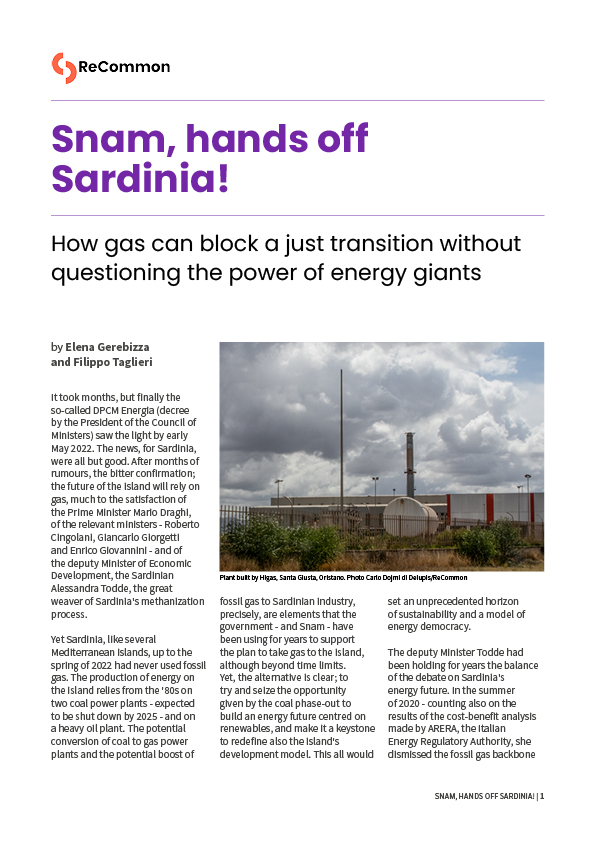ReCommon today publishes “Snam, hands off Sardinia”, an analysis of how the interests of one of the most important Italian companies, strongly supported by the government, are heavily penalizing the path of just energy transition that Sardinia could have instead undertaken. Sardinia is one of the Italian regions most marked in the past by an industrialization process harmful to the environment and communities.

The “DPCM Energia”, a government decree emitted in early May, confirms that the future of the island will be centered on gas. Out of time, given that this fossil fuel had never been used in Sardinia, where a real energy transition based on alternative sources was hoped after the coal phase out,
Snam has been pushing for the “methanisation” of Sardinia for years. Through its subsidiary Enura, the multinational transformed the “backbone” project, i.e. a gas pipeline that was supposed to cross the island from north to south, into three “mini-backbones”, i.e. distribution networks concentrated in the three poles of the island where there are large industries and the largest inhabited centers, located in the north-west in the Porto Torres area, in the Oristano area, in the south-west in the Sulcis Iglesiente area and in the Cagliari and Sarroch area.
The entry points for gas would be two new regasification plants, one to the north and one to the south, for the import of fossil gas by ship.
The status of emergency generated by the war helped create the basis for legitimizing a plan to say the least anachronistic, which places a heavy mortgage on the future of Sardinia. The “DPCM Energia” relaunches the construction of floating storage and regasification terminals (FSRU) as an alternative to the import of Russian gas. This is the case not only in Sardinia, but also on the coasts of the Italian peninsula. Also this enhances the need to find other suppliers mainly of liquid gas transported by ship.
“Sardinia does not deserve continuous promises of development, illusory and out of time. Instead, it deserves the reclamation that has been awaited for years, an energy planning rooted in the territories, based on local energy communities and the participation of the population. Unfortunately, as we are seeing, gas is an addiction that has consequences not only on climate change. Snam seems to turn a blind eye in order not to question its future development plans, in which Sardinia is just a map to be colored in” said Filippo Taglieri of ReCommon, author of the report.
“It is unacceptable to place such a heavy burden on the future of a land that for decades has been sacrificed to military servitude and to an industrial model that has polluted and undermined people’s health. With the skyrocketing price of gas, and the evidence of the impacts of the economic model in which it is based, Sardinia should seize the opportunity to turn the page from the fossil economy, and plan its energy future from the bottom up, outside of the extractivist model and starting from the territories” said Elena Gerebizza, also the author of the report.
